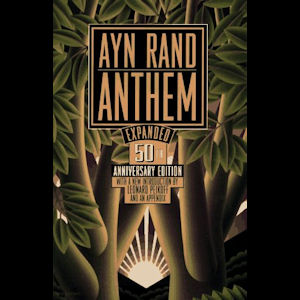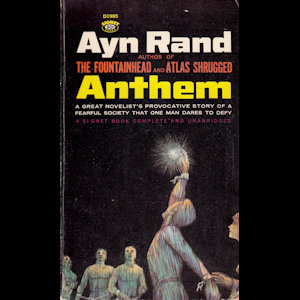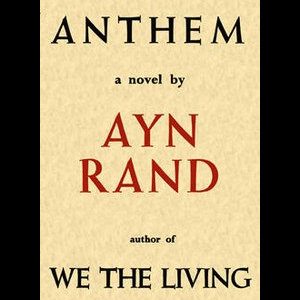Anthem by Ayn Rand - Sci-Fi Classic Review
 | | The version I own, which shows Rand's handwritten edits to the more verbose British version that was published first |
At first, man was enslaved by the Gods. But he broke their chains. Then he was enslaved by the kings. But he broke their chains. He was enslaved by his birth, by his kin, by his race. But he broke their chains. He declared to all his brothers that a man has rights which neither god nor king nor other men can take away from him, no matter what their number, for his is the right of man, and there is no right on earth above this right. And he stood on the threshold of the freedom for which the blood of the centuries behind him had been spilled. But then he gave up all he had won, and fell lower than his savage beginning.
It is impossible to write about famed author Ayn Rand without discussing her controversial politics. On one hand, she is one of the most significant writers of the Twentieth Century, with her Atlas Shrugged deemed the second most influential book behind the Bible in a 1991 survey by the U.S. Library of Congress. In 2009, shortly after the global financial crisis began, it even ranked #1 on Amazon's best-seller list for "Fiction & Literature," proving that it remains as popular as ever, especially in times of economic uncertainty. On the other hand, the quasi-religious, quasi-political movement Ayn Rand birthed, Objectivism, is so out there, even many dedicated libertarians consider it a fringe movement they are embarassed to be associated with. Ayn Rand's life is also marked by this bizarre dichotomy, with her early struggles in her homeland of Russia and subsequent flight to America serving as an inspirational tale of the power of the American dream, but her antics late in life are downright cultish when viewed from an outside perspective.
Atlas Shrugged, a tome of a novel I may review on this site some day when I have enough time to reread it, is Rand at her most prosthelytizing, at least in fiction, and I don't recommend it for people seeking to be introduced to her work. A far better starting point--and I'd argue a far better novel--is Anthem, a breezy, hundred-ish page story set in a dystopic future where an extreme form of collectivism has done its best to eradicate every notion of individuality and egotism. In an inverted version of Huxley's seminal Brave New World, the universe of Anthem is one where technology has been all but eradicated, where modern acceptance of the candle--an instrument seen as the height of human innovation--took well over a decade to approve and implement. Everything must be done collectively or it is deemed evil and sinful, and anyone caught thinking or acting for themselves is brutally punished, even put to death.
 | | This relatively rare cover is probably my favorite |
Enter Equality 7-2521, a young man who has always been a bit different. Unusually tall and unusually intelligent, Equality 7-2521 learned as a child that his impulses were impure, that his yearnings were driven by the "Transgression of Preference." He asked too many questions, wanted too much, and was too ambitious. One day, he discovers a long-abandoned underground metro tunnel and begins exploring its depths in secret. Over the course of two years, he discovers and learns the basics of electricity, and he is so awe-struck by it, he thinks the leaders of his society will absolve him of his lawlessness and embrace his newfound technology, for the good of everyone. Of course, they reject it outright and accuse Equality 7-2521 of heresy, forcing him to flee into the Uncharted Forests on the outskirts of town, lest he be burned at the stake.
Anthem, first published in 1938 after Ayn Rand's agent convinced her to adapt it from an unpublished play she had written titled Ego, is Ayn Rand at her simplest and least controversial. It was well-received in its day, though a few contemporary reviewers complained that it wasn't believable or that it grossly misinterprets the aims of collectivism as a political movement. Most, however, praised it for its simplicity and eloquent writing. Nowadays, it finds itself on many required reading courses in high schools across the country, and it is generally regarded as one of the most important works of dystopic fiction.
From a political perspective, the naysayers make a relatively valid point, but like any good dystopia, Anthem is an exercize in extreme elaboration. Nothing about its view of a hyper-collectivist society is terribly unfair, and nothing makes it any less plausible than, say, Nineteen Eighty-Four. It is a warning about society becoming overly enthusiastic about a particular view, one Rand, as a woman who fled an oppressively collectivist country, was extremely touchy about. Is her vision of a future where the word "I" has become blasphemous a convincing one? Not really, but it is deliberately radical in order to highlight Rand's views on individualism and the natural rights of man, ideas that have been relatively popular in the West--especially America--since the Enlightenment.
 | | The classic, minimalist design |
Granted, even though it is a short novel, there are places where Rand simply can't help herself and gets carried away espousing her political opinions in the guise of writing fiction. Her inability to separate the two is perhaps Rand's greatest flaw as a writer, though later in her career, I'd argue a lack of editing becomes even more problematic. Still, she pulls off some interesting tricks of literary style. For example, the vast majority of the book, which presents itself as a fictional diary, is written by someone unfamiliar with singular pronouns, refering to himself in the plural first person (we, our, etc.) and everyone else in the plural third (them, their, etc). This can seem infuriatingly obtuse and a little difficult to get used to, but it's worth it when, a couple of chapters before the end, Equality 7-2521, a.k.a. Prometheus, discovers how to write in the singular. The writing becomes jarringly more coherent and easier to understand at this point, which makes his enlightenment feel much more profound and tactile than it otherwise would.
The aspect of the story that rings hollow for me, though, is the character of Liberty 5-3000, a.k.a. The Golden One, a.k.a. Gaea. She is Equality 7-2521's love interest, and she seems to serve little purpose beyond just following him on his journey, becoming subservient to his whims, and becoming the mother of his future child. Though I try to put the story in the context of its time, Liberty 5-3000 is just a horribly written female character, easily one of Rand's worst. She is an object rather than a person, and she feels like the kind of zero-dimensional character you'd find thrown into a Hollywood movie just to tick the romantic sub-plot box on the blockbuster formula chart. I find almost every page with her on it to be cringe-worthy, especially the one where the narrator says, "We get to pick our names, and I've decided your name should be Gaea," and she reacts with, "It shall be my name."
That complaint aside, I first read Anthem in high school and was profoundly influenced by it. For this reason, when I reread it for the purposes of this review, I tried to be extra critical, to counteract my nostalgia and how much it has informed who I have become as an adult. I can definitively say it's not a perfect novel, but it still deserves to be considered a science-fiction classic. Its political message is inoffensive to anyone who believes in individual rights, and it's nowhere near as unrestrained, obtuse, or dubious as Rand's later works, when she would go all-in on Objectivism. (I feel the need to point out that I consider The Fountainhead--a book that doesn't qualify as science-fiction and which I probably won't review here--to be her best work, though like Atlas Shrugged, it's not for Ayn Rand beginners.) As I said, it's all but impossible to let go of the baggage that surrounds Rand, but if there's one book that absolutely deserves the attempt, it's Anthem.
-e. magill 3/7/2019
|
|